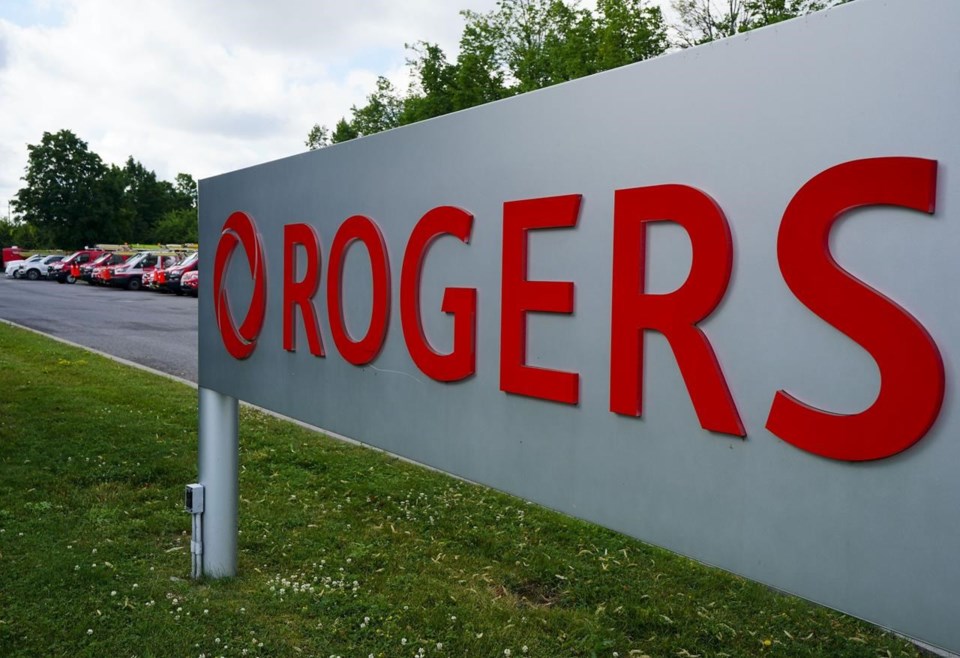Rogers Communications Inc. is now Canada's most complained about telecommunications provider, accounting for one out of every five complaints and overtaking Bell Canada in an annual report measuring consumer gripes within the industry.
The annual study by the independent Commission for Complaints for Telecom-television Services detailed the numerous issues it was notified about between Aug. 1, 2022 and July 31, 2023.
It said that for the first time in the commission's 15-year history, Rogers topped the list of complaints from its customers, as the company accounted for 19.8 per cent of the total for 2022-23.
Complaints about Rogers increased by 43.6 per cent from the previous year, compared with a 14 per cent increase in complaints for all service providers.
Bell, with 16.1 per cent of all complaints received, and Telus Corp., with 12.3 per cent, were the next highest on the list, with the latter seeing a 43.2 per cent jump in issues reported to the commission compared with the previous year.
That ranking remained the same when combined with complaints by customers of the various subsidiary brands owned by the big three providers.
CCTS commissioner and CEO Howard Maker said the annual report is meant to provide a window for carriers into how their costumers are feeling and to show trends over time. He said "there's clear evidence that service providers are reacting to what they hear from us" over the long term.
"It's not uncommon for us to call out a service provider one year for an issue and then the next year to see many fewer complaints about that various issue," he said.
"Certainly, none of them like being trolled this way in the media ... but we do think the purpose of our annual report is to consolidate all that data so that service providers can see where their customers' pain points are."
The Rogers group, which includes Shaw since its purchase of the company was finalized last April and other Rogers-owned discount brands like Fido, made up 36 per cent of all accepted complaints in 2022-23. That was followed by the Bell group, which includes Virgin Plus, at one-quarter.
The Telus group, with Koodo and Public Mobile under its umbrella, had 19 per cent.
But Rogers spokesman Cam Gordon said an extremely small percentage of Rogers customer service interactions led to CCTS complaints.
“As we continue to grow our customer base and welcome new customers, our commitment to deliver the best customer experience is stronger than ever," said Gordon in a statement.
"One complaint is one too many and we're working hard to make sure every interaction we have with millions of Canadians every month is seamless."
For Rogers, wireless issues made up 45 per cent of all complaints and were up 35 per cent year-over-year, as the company's customers also complained more about experiencing a complete loss of service, incorrect charges, not receiving a refund or credit, and the quality of service.
Telus saw a 48 per cent increase in wireless issues, which now account for 57 per cent of its customers' complaints, while internet issues went up by 29 per cent even as the service providers collectively saw a six per cent decline in that category.
Meanwhile, complaints about Bell's wireless service declined 19 per cent, but still account for 44 per cent of the company's issues.
Bell’s internet issues decreased by 13 per cent, while disclosure was the company's No. 1 issue this year, followed by issues related to incorrect charges.
Maker said the numbers reflect how Bell "has been working really hard to try and reduce its complaint numbers," something which the company has publicly stated it intended to do.
Bell spokeswoman Jacqueline Michelis said it marked the eighth consecutive year that Bell has decreased its share of industry complaints.
"Our overall percentage of complaints per number of subscribers is among the best in our industry," she said in a statement.
"We’ll continue our laser focus on championing the customer experience, including improving our processes to make it easier to interact with Bell, and continuing to enhance our digital tools."
Telus did not immediately respond to a request for comment.
The report highlighted notable themes, including that Canadian telecommunications customers are experiencing significant service performance problems amid rising outage complaints.
Complaints from customers experiencing a complete loss of service increased, with 93 per cent more issues reported by wireless customers and 48 per cent more from internet customers.
Consumers also doubled their complaints about roaming charges for the second straight year, according to the commission.
Both Bell and Telus hiked their roaming rates last year, which caught the attention of federal Industry Minister François-Philippe Champagne, who subsequently asked the CRTC to look into the issue.
The minister has said companies could be increasing roaming fees as a way to raise overall costs without consumers being aware.
This report by The Canadian Press was first published Jan. 16,2024.
Companies in this story: (TSX:RCI.B, TSX:BCE, TSX:T)
Sammy Hudes, The Canadian Press



